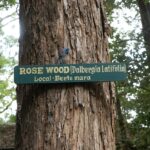
A recent report by the Institute for Security Studies (ISS) reveals that illegal logging in Mali generated around $13.8 million between 2019 and 2021, providing significant financial support to extremist organisations such as the Jama’a Nusrat al-Islam wal-Muslimin (JNIM) or ‘Groupe de Soutien à l’Islam et aux Musulmans’ (Support Group for Islam and Muslims, GSIM).
The ISS report also highlights the role of corruption in maintaining this illegal trade. “Malian forestry officials and civil servants often turn a blind eye to the illegal exploitation and export of timber, particularly Kosso, a protected species of rosewood,” it states.
Between 2020 and 2022, some 220,000 Kosso logs were illegally exported to China through the port of Dakar in Senegal.
Illicit economies play a key role in Jnim’s expansion strategy, especially in securing resources and legitimacy in the areas under their control. There are various accounts of the group’s presence in and control of mining, logging and illicit trading sectors across the Sahel.
Since 2021, Jnim’s incursions into the southern regions have targeted the Baoulé reserves situated between Kayes and Koulikoro. Jnim fighters are not involved in logging itself. Instead, they control the forest reserves and demand fees from illegal loggers wanting to access the area.
Jnim also actively responded to grievances between loggers and bandits operating within the forest. Loggers provided the whereabouts of bandits to the insurgents, who were more proactive than security agents. People in the area told ISS that Jnim dislodged the bandits, often killing those who did not align with its dictates. Jnim’s response to this longstanding threat against the loggers was a significant move that further built relationships with communities seeking protection and better livelihoods.
The logging and export of Kosso — an endangered rosewood tree protected by the Convention on International Trade in Endangered Species of Wild Fauna and Flora — from areas controlled by Jnim involves significant bribery of forestry agents and government officials. Chinese traders are also reportedly involved in large-scale logging and timber trafficking, particularly Kosso, from Mali to China.
UNODC’s 2024 World Wildlife Crime Report has a case study on the illegal trade in rosewood, with a focus on Nigeria. Major players in the case study include China, India, Singapore, Mali, Guinea-Bissau, Brazil, Vietnam and Ghana.
Guinea’s Minister of Justice has ordered legal proceedings against four government officials over an alleged illegal export of hundreds of containers of critically endangered West African rosewood to China.
The note from Minister Alphonse Charles Wright cites allegations concerning illegal logging, violating timber trade regulations, corrupting public officials, public funds embezzlement and forgery.
The officials appear to have been involved in issuing fake export certificates for at least 377 containers (6,409 metric tonnes) of Pterocarpus erinaceus, or Kosso, a protected rosewood tree native to semi-arid forests of West Africa.
Ghana and Mali are also cited.
China’s forays into Africa’s huge forest resources and indulgence in illegal trade disregarding the environment could lead to a disaster of monumental proportions.
A recent investigative report by international NGO Environmental Investigation Agency (EIA) has claimed that China’s illegal imports of rosewood has led to massive devastation of Malian forests besides serving as a conduit for ivory smuggling. Western African state of Mali has become one of China’s leading rosewood suppliers .
Between May 2020 and March 2022, China imported from Mali 220,000 trees’ worth —148,000 tons — of a type of rosewood known as kosso despite a ban on its harvest and trade in the troubled West Africa nation, a report released Wednesday by the Environmental Investigation Agency (EIA) found.
Click here to access the Global Illegal Logging and Associated Trade (ILAT) Risk assessment tool and to download the Forest Trends User Guide describing the functionality of the ILAT Risk Data Tool.
Click here to access the Cattle Data Tool.





